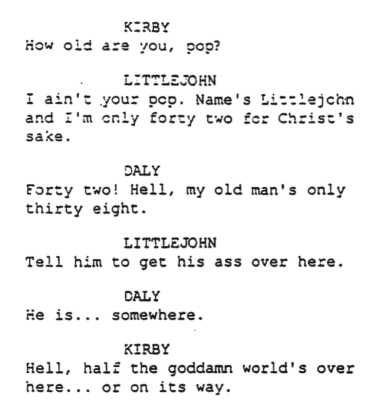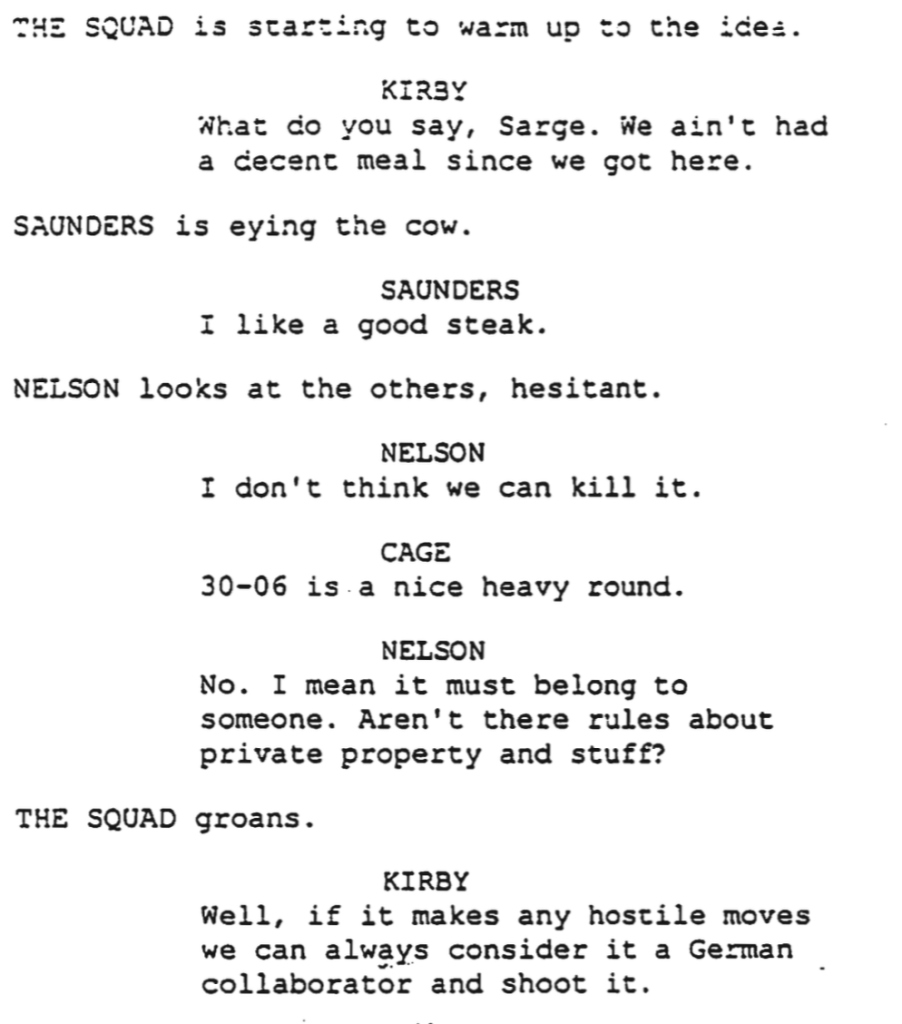**Alert to all major Hollywood studios – Your next war movie is here!**
Genre: War
Premise: A reluctant Sergeant in World War 2 must guide a ragtag group of soldiers to a small French town, encountering all of war’s glorious randomness along the way.
About: Man, I can’t find ANYTHING on this project. It seems to have fallen through the cracks. The script is written by Terminator 2 co-writer, William Wisher. I only read it because I was looking through my script folder and saw, “Wisher” in the file title. I said, “Hmm, I wonder if that’s William Wisher.” I then assumed it couldn’t possibly be any good or else I would’ve heard about it. I turned out to be way wrong on that one. This script is awesome.
Writer: William Wisher
Details: 114 pages
Over Thanksgiving, I took a break from the kitchen to catch some football, only to end up stumbling upon Terminator 2. As many of you know, Terminator 2 is the most impossible movie to accidentally stumble upon and not watch the whole thing. So while I kept saying I was going to watch “one more scene,” I ended up watching the entire film.
Most everyone gives the credit of that film to James Cameron. And why wouldn’t they? He’s James Cameron. However, there was always that other credit on the poster – William Wisher. Who was this guy? How come I knew nothing about him other than hearing his name associated with this movie? I figured he must be one of those lucky dopes who caught the coattails of a famous director in rare form and whose contributions to the screenplay were limited to slugline maintenance and character re-naming.
Boy was I wrong. “Combat” proves that not only is William Wisher a good writer, but that the Hollywood establishment missed one. This movie should’ve been made. And the powers that be still have the ability to right that wrong.
When we meet Private Charles Saunders, he’s in one of those gutted soldier-boat things they use to storm beaches. Which, coincidentally, happens to be exactly what they’re doing. They’re prepping to storm Omaha Beach, and when they get there, all fucking hell breaks loose. Everyone else on Saunders’s boat is killed. But he somehow survives.
Once he’s able to find cover, he’s told by a superior that he’s been upgraded to Sergeant, something Saunders is none too happy about since he has no idea what he’s doing. Before he can even find a gun, he’s got his first order: Find some other stragglers who’ve lost their platoons and cobble together a Survivors Team.
Saunders does as told, accumulating a handful of dudes you wouldn’t trust in your living room, much less trust your life to. There’s Littlejohn, a cook who barely knows how to operate a gun. There’s Cajun, an engineer from New Orleans. There’s Nelson, an intelligent guy cursed by cowardice. And a few others.
Saunders is given orders to head to a small town in France which they’ll be turning into a makeshift hospital for a battle to take place nearby. Their job is to secure the town and start preparing it. It seems like a relatively simple order. They get to travel outside the war zone and aren’t predicted to encounter any fighting. Of course, nothing goes according to plan in war.
The Germans are throwing everything at the Allies, including children and old men, who are fighting with a desperation that makes them scarier than even Germany’s best-trained soldiers. The Communists are also rolling in, and are said to be leaving a trail of destruction of their own. Let’s not forget the French Resistance, a rag-tag group of soldiers who are so filled with rage, they’re determined that everyone suffer their wrath. And finally, watch out for exploding cows. We’ve got those too. Nobody is safe during war, as all the glories and horrors of combat will be highlighted in one giant smörgåsbord of chaos.
If I haven’t been clear enough, I loved this script. Here’s why.
I was talking to a writer recently who’s writing a war movie of his own and having trouble with the soldiers’ dialogue. You see, when you write soldier dialogue, the temptation is to write a bunch of tough-guy-speak where all that matters is crude jokes and machismo. However, that’s not how the real world works. Not completely, anyway.
People speak because they want something. They speak to persuade others. They speak to try and impress someone. They speak because they’re nervous and want to fill in the silence. Take the one of the most common character archetypes. The Jokester. The Jokester’s not railing off jokes because this is a movie and it’s his character’s job to “be the funny one.” He’s doing it because he wants people to like him. The laughs validate him, make him feel good about himself. That’s why he jokes. The lesson being, as long as there’s a reason to speak, your dialogue will feel natural. And that’s the feeling I got here. There was none of this “try-hard” forced tough-guy dialogue. The soldiers all spoke like genuine human beings.
There are also a lot of powerful moments in the script – stuff that gave you insight into characters that the average writer wouldn’t have even thought about. One of my favorite moments is when Saunders tells his superior, Hanley, “I’m not cut out to be a Sergeant. I don’t even know what I’m doing.” Saunders’ flaw is that he doesn’t believe in himself. Hanley calmly guides Saunders’ attention to his team. “Do you think he should be in charge?” He points to the young scared kid. “No.” “What about him?” He points to the crazy guy. “No.” “What about him?” He points to the scatterbrain. “Well, no.” And Saunders finally comes to the realization that… wow, he’s right. I am the best man for the job.
I bring this scene up because most writers don’t go through the trouble of exploring a feeling. They have the character continue to say shit like, “I’m no good at this,” in subtle variations throughout the movie. By creating this moment that highlights the problem and attacks it head-on, it becomes concrete as opposed to abstract.
But that was just the little stuff. Combat has these brilliant sequences that highlight the randomness of war. I’m going to get into spoilers here and since I’m going to link to the script at the end of the review, I suggest you read it before you read this.
There’s this sequence where the soldiers, who are tired and hungry, walking through the countryside, come upon a… COW. The cow is just standing there like cows do. And the group tries to decide whether they should kill the thing and eat it, since they’re so damn hungry.
All of a sudden, the cow fucking EXPLODES! And they realize they’re in the middle of a mine field. At this moment, a German plane starts flying around and dropping bombs on them. They have to avoid the bombs while also not stepping on any mines. THAT’S A FUCKING SET PIECE!
This leads to a scene where they come upon a French house, see that the parents and the daughter have been gutted and hanged, discover a surviving 17 year old girl (the other daughter) hiding in the barn. She explains that the Communists – who, according to her, are far worse than the Germans – did this. The soldiers are devastated for the young girl. They then have her guide them to the town they’re looking for. But on the way, they’re attacked by Germans, who are in turn attacked by the French Resistance, who help the Americans defeat the German contingent.
The French Resistance leader, a woman, then comes over and casually shoots the 17 year-old girl in the head! The Americans all stare at her, gobsmacked. The leader explains that the girl’s family sold secrets to the Germans resulting in dozens of Jews being sent to concentration camps, all for money and land.
Take a moment and think about how complex this moment is. We saw this girl’s family not just murdered, but tortured and gutted. We feel terrible for this girl and want to do anything for her. Now, however, we’re wondering if she led us into a trap. Then this French woman kills her in cold blood. She tells us her family sold secrets to the Germans for money. But the girl was still 17. I doubt she was involved in any of those decisions. Does she deserve to be killed? And how do we even know this French woman is telling the truth??
That moment is what made the script for me. It siphoned all of the craziness into one moment that proved just how complex war is.
I mean, wow.
I know what some people are going to say. There’s some crossover here with Saving Private Ryan. In fact, that’s the only explanation I can think of for why this wasn’t made. That the script came out at around the same time as Saving Private Ryan’s (I don’t know if that’s true since the script’s undated). But here’s the thing. This script is a lot better than Saving Private Ryan from the 20 minute mark on. And a director with a unique vision could easily differentiate the film.
I want to see this movie. Who’s going to claim it?
Script link: Combat
[ ] What the hell did I just read?
[ ] wasn’t for me
[ ] worth the read
[x] impressive
[ ] genius
What I learned: “Combat” taught me that you can make subject matter the concept. It’s risky. Because “subject matter” is general and I typically encourage specificity in concept-creation. But that’s literally what Wisher does. He built a story around the subject matter of “combat.” The challenges of it, the unpredictability, the randomness, the fear involved. There isn’t a huge plot here. It’s about combat during war.




